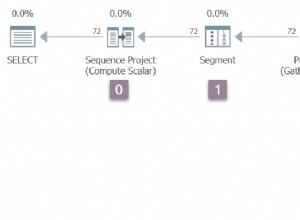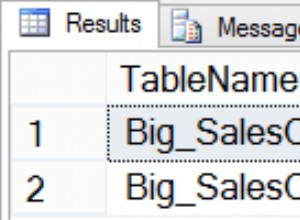Sie können das DBMS_SQL-Paket verwenden. Dies bietet eine alternative Möglichkeit, dynamisches SQL auszuführen. Es ist vielleicht etwas umständlicher zu verwenden, aber es kann flexibler sein, insbesondere bei einer unterschiedlichen Anzahl von Bindungsparametern.
So könnten Sie es verwenden (Warnung:Ich habe das nicht getestet):
FUNCTION player_search (
pName IN VARCHAR2,
pHeight IN NUMBER,
pTeam IN VARCHAR2
) RETURN SYS_REFCURSOR
IS
cursor_name INTEGER;
ignore INTEGER;
id_var MyTable.ID%TYPE;
name_var MyTable.Name%TYPE;
height_var MyTable.Height%TYPE;
team_var MyTable.Team%TYPE;
BEGIN
-- Put together SQLQuery here...
-- Open the cursor and parse the query
cursor_name := DBMS_SQL.OPEN_CURSOR;
DBMS_SQL.PARSE(cursor_name, SQLQuery, DBMS_SQL.NATIVE);
-- Define the columns that the query returns.
-- (The last number for columns 2 and 4 is the size of the
-- VARCHAR2 columns. Feel free to change them.)
DBMS_SQL.DEFINE_COLUMN(cursor_name, 1, id_var);
DBMS_SQL.DEFINE_COLUMN(cursor_name, 2, name_var, 30);
DBMS_SQL.DEFINE_COLUMN(cursor_name, 3, height_var);
DBMS_SQL.DEFINE_COLUMN(cursor_name, 4, team_var, 30);
-- Add bind variables depending on whether they were added to
-- the query.
IF pName IS NOT NULL THEN
DBMS_SQL.BIND_VARIABLE(cursor_name, ':pName', pName);
END IF;
IF pHeight > 0 THEN
DBMS_SQL.BIND_VARIABLE(cursor_name, ':pHeight', pHeight);
END IF;
IF pTeam IS NOT NULL THEN
DBMS_SQL.BIND_VARIABLE(cursor_name, ':pTeam', pTeam);
END IF;
-- Run the query.
-- (The return value of DBMS_SQL.EXECUTE for SELECT queries is undefined,
-- so we must ignore it.)
ignore := DBMS_SQL.EXECUTE(cursor_name);
-- Convert the DBMS_SQL cursor into a PL/SQL REF CURSOR.
RETURN DBMS_SQL.TO_REFCURSOR(cursor_name);
EXCEPTION
WHEN OTHERS THEN
-- Ensure that the cursor is closed.
IF DBMS_SQL.IS_OPEN(cursor_name) THEN
DBMS_SQL.CLOSE_CURSOR(cursor_name);
END IF;
RAISE;
END;
(Hinweis:DBMS_SQL.TO_REFCURSOR ist neu in Oracle 11g.)




